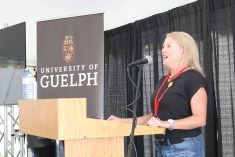Negotiations between Canadian Pacific management and the union representing some 3,000 engineers and conductors have broken down, CP said in a press release early Sunday morning.
Last minute bargaining did produce a tentative four-year agreement with another union, Unifor, that represents CP’s 1,200 active mechanical employees that maintain rail cars and locomotives.
Members of the Teamsters Canada Rail Conference-Running Trades (TCRC), which represents the locomotive engineers and conductors, issued their own press release in response to that of CP.
“Picket lines are now being set up across Canada and the rail shut down is happening,” said TCRC president Doug Finnson in a press release.
Read Also

Grain Growers call for Port of Vancouver to be included in federal major projects
The Grain Growers of Canada (GGC) is calling on the federal government and the Major Projects Office to designate the Port of Vancouver and its connecting rail infrastructure as a project of national significance. The first list of projects being considered was released Sept. 11.
Finnson told the Western Producer Feb. 11 that talks with CP would continue until the strike deadline, adding that union negotiators were hopeful that an agreement could be reached.
But Finnson also said at that time little progress had been made on the workers’ primary bargaining issue, which involves rest periods and shift relief for workers who don’t want to work more than 10 hours in a single shift.
Finnson said CP’s record in providing relief crews has been poor.
In their news release, CP CEO Hunter Harrison said they have been working for more than a year presenting the TCRC leadership with options and choices to improve the quality of life for employees while driving efficiencies in the business.
“Our conductors and engineers have plenty of options for time off, but the vast majority don’t take full advantage of those opportunities,” Harrison said. “We want to implement a model that allows us to properly schedule crews while maintaining the highest standards of safe railroading.”
Scheduling is another major point of contention, according to Finnson.
Under the current scheduling system, train workers that are off duty are never entirely sure when their next shift will start, a situation that affects their quality of life during time off.
Speaking at an investor’s conference Feb. 11, CP chief operating officer Keith Creel said the company will be prepared if workers walk off the job, adding that managers will be ready to take over if engineers and conductors go on strike.














